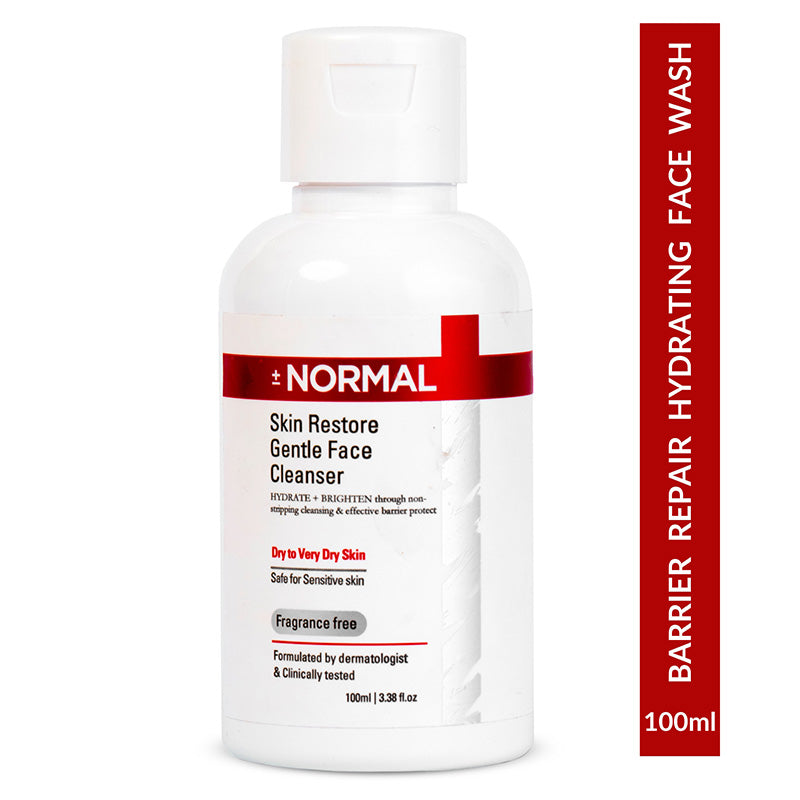Sensitive Skin Explained
Dry Sensitive Skin - It is both sensitive and lacks sufficient moisture. It is characterized by heightened reactivity to external factors, resulting in sensation of burning, pain, itching, or tingling. This skin type has a tendency to feel tight, rough, and may appear flaky or dull due to inadequate oil production and moisture retention. Proper care involves using gentle and hydrating skincare products to soothe sensitivity and maintain the skin's moisture balance.
Dry, sensitive skin benefits from non-fragrant, antioxidants and skin-soothing ingredients.
Oily Sensitive Skin - It is both sensitive and produces an excess of sebum. Individuals with this skin type experience heightened reactivity to external stimuli, which may cause burning, pain, itching, or tingling sensations. Additionally, their skin produces more oil than normal, leading to a shiny or greasy appearance, especially in the T-zone area (forehead, nose, and chin). Managing this skin type requires using gentle, non-irritating skincare products and balancing sebum production without causing further sensitivity.
Oily, sensitive skin needs a special blend of non-greasy hydrators, gentle antioxidants and skin-replenishing ingredients.
How do you know if you have sensitive skin?
If you notice any kind of skin irritation (redness, itching , burning sensation) especially when using any skin care products, it may indicate you have sensitive skin.
The best way to find out is to have a dermatologist check your skin.
What are the causes for sensitive skin?
- Genetic Predisposition: Some individuals are genetically more prone to sensitive skin, as they may inherit a more reactive skin barrier.
- Weak Skin Barrier: A weakened skin barrier allows irritants and allergens to penetrate the skin more easily, leading to sensitivity.
- Environmental Factors: Exposure to harsh weather conditions, air pollution, and UV radiation can trigger sensitivity in the skin.
- Allergens: Allergic reactions to certain substances, such as fragrances, preservatives, or specific ingredients in skincare products, can cause skin sensitivity.
- Certain Medications: Some medications may cause skin sensitivity as a side effect.
- Hormonal Changes: Hormonal fluctuations, such as during pregnancy or menopause, can make the skin more sensitive.
What are the ways to treat sensitive skin?
- Use a mild, sulfate-free cleanser to cleanse your face, and avoid harsh scrubbing or exfoliation
- Use lukewarm water instead of hot water for washing your face and body as hot water can strip the skin of natural oils. Avoid take very long showers
- Pat dry skin gently instead of rubbing it vigorously.
- Apply a gentle, hydrating moisturizer daily to help maintain the skin's moisture balance.
- Avoid skin-aggravating ingredients, including alcohol (SD or denatured), menthol, and fragrant essential oils. Instead opt for fragrance-free, hypoallergenic, and non-comedogenic skincare products specifically formulated for sensitive skin.
- Always patch test new products before applying them to your entire face to check for any adverse reactions
- Use a gentle, fragrance-free laundry detergent to wash clothes Wear breathable fabric like cotton.
- Be mindful of environmental factors that may trigger sensitivity, such as extreme weather conditions.
- Always use a sunscreen
- Consult a dermatologist for personalised advice and treatment recommendations if you are experiencing persistent or severe sensitivity,
